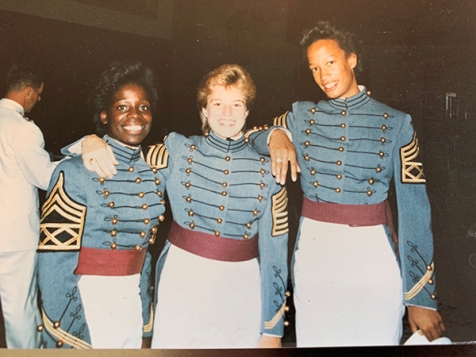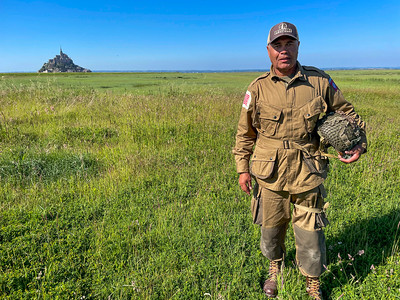How did West Point develop you as a leader?
There is no question that our cadet experience was a central part of some of our most formative years. Few places in the world provide such an immersive 24/7, 365 laboratory for leadership. It’s a daily test of how do you become a leader among your peers? How do you function as a leader of large, diverse groups? How are you a leader situationally? I think West Point does a great job of consistently pressure testing cadets and allowing some level of failure. Because as much as we don’t like to think about failure, having the opportunity to be exposed to challenging situations, fail, learn, and evolve makes every graduate, including myself, I hope, a better leader. I have a deep love for the ethos of West Point. I am in awe of the fact that this institution exists and continues to serve such a vital purpose in our lives, our time, and our country. I take comfort knowing that a place like West Point is resilient, enduring, and remains so relevant.
“You have to find within yourself your reason for giving. I suspect that for most, the animating force is gratitude. The vast majority of us believe our West Point experience made a material difference in our lives. I would ask graduates to explore what that means for them and how giving connects them to that gratitude and connects them to the institution’s continued vitality. And, for those who may think their gift wouldn’t be significant enough to matter—every gift matters.”
— Jill Schurtz ’86
What inspired you to start giving to West Point?
As I got further away from graduation, I realized that the Army doesn’t fully fund a significant number of activities at the Academy. Realizing that this funding gap existed and reflecting on the Academy’s impact changed how I began to think about its place in my family’s giving. And there is a moment that, once you start reflecting on it, giving to West Point becomes an act of gratitude fundamentally. Like so many graduates, I have always felt grateful for the opportunity to be at West Point—it made such a difference in my life. That sense of gratitude has continued to grow as I’ve gotten older. Just as important, giving back to the Academy is another way to express support for the institution and our desire to see it remain vibrant.
Why do you support the areas that you do?
We make our decisions around giving as a family. As a couple, we try to be intentional about where we devote our resources, time, and support. There was absolutely no doubt for both of us that West Point is a place we want to support. For us, it fits squarely within our framework of gratitude, mission, and impact. We also talk about it with our children to make sure they understand its importance as well. In terms of directing our giving, we believe it’s important to support a general fund like the Superintendent’s Annual Fund because it allows the leadership on the ground to make allocation decisions, which we think has a multiplier effect. We are also happy to support more targeted institutional initiatives. With our recent class gift, we were impressed with the thoughtfulness around the selection of cybersecurity. It resonated not only from a West Point perspective but also from a national priorities perspective. After reflecting on some of the specific activities that touched my life as a cadet, we’ve also tried to be intentional about providing support to women’s athletics.

How do you hope to impact the Academy?
We think it’s important to demonstrate support for what the institution means to us, what it means for all current graduates and cadets, and its relevance to society and our country. We hope our giving will improve in some small way the cadet experience —especially as cadets have chosen to join our ranks knowing that there is a reasonable likelihood they will be deployed in dangerous areas. I have a tremendous amount of respect for them, and if we can incrementally improve their experience, I think that’s worthwhile.
What would you say to other graduates who are considering giving?
You have to find within yourself your reason for giving. I suspect that for most, the animating force is gratitude. The vast majority of us believe this experience made a material difference in our lives. I would ask graduates to explore what that means for them and how giving connects them to that gratitude and connects them to the institution’s continued vitality. And, for those who may think their gift wouldn’t be significant enough to matter —every gift matters. Like many things in life, every show of support is fundamentally important. Every dollar moves the needle for impact. The success of any particular year of giving is measured by multiple metrics. Obviously, yes, the total dollar amount that goes to support the Academy is critical, but there is as much attention placed on the number of people participating because it’s an essential measure of long-term institutional support as well as an indication of how the alumni feel about the place that gave them so much.

Jill Schurtz
As a cadet, Jill Schurtz majored in History, was the first woman to receive the Commandant’s Award for Leadership, and was captain of the Softball Team. After graduation, she served seven years in uniform as a transportation corps officer, stateside and in Korea. She later received her J.D. from Columbia University School of Law, was CEO of a NY-based asset management firm, and is currently the Executive Director and CEO of the St. Paul Teachers’ Retirement Fund Association, where she oversees investments and pension benefits administration.




